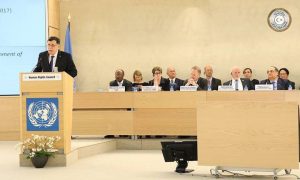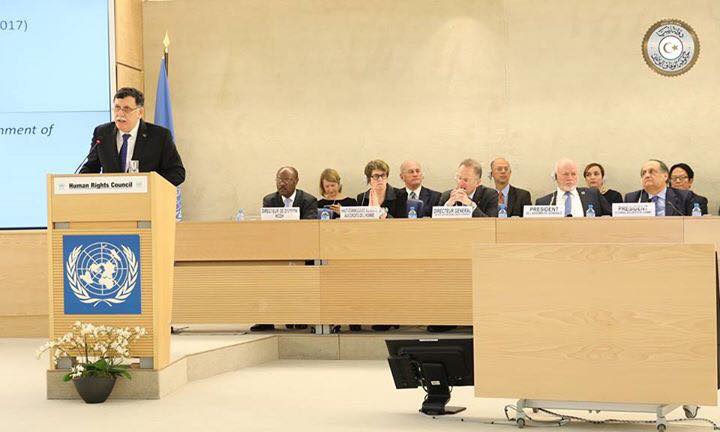By Jamie Prentis.

Tunis, 27 February 2017:
Libya is guilty of the human rights violations of unarmed civilians, including disappearances and torture Presidency Council (PC) head Faiez Serraj admitted today.
Serraj told a UN Human Rights Council in Geneva that it was critical to bolster efforts to stop armed groups and prevent human-trafficking gangs.
“This is a reason for grave concern” he said, “We have done our utmost to find a comprehensive political solution to end these violations. We will follow the obligations of the Libyan Political Agreement when it comes to human rights, including detainees and compensation for victims.”
The PC head said that Libya also needs a programme that reintegrates former combatants and tackles the rampant usage of militias.
He criticised the decision in eastern Libya to “restrict the freedom of our people”-a reference to the decree that 18-45 year old must seek security clearance to travel abroad from territory controlled by Libyan National Army. He also lambasted the original decision, now frozen, to prevent women under the age of 60 from travelling aboard solo.
“We condemn the announcement by some illegitimate authorities that have put restrictions on the right to travel and encroached on the rights of women, under the pretext of defending national security,” Serraj said.
He insisted the PC gave great attention to women and children and did not neglect either health or education.
Nonetheless, Serraj asked for greater funding from the “states able to provide assistance” to help his government carry out its policies.
Earlier in the day Serraj had met Palestinian president Mahmoud Abbas and they may well have discussed Salam Fayyad the newly-appointed Palestinian successor to Martin Kobler as head of UNSMIL.
Serraj told the UN gathering: “We support the Palestinian people who have lived under Israeli occupation. Peace cannot be achieved unless grave violations of human rights are accounted for.”
Serraj also saw new UN Secretary-General Antonio Guterres and told him he believed Libya’s various militias could be moulded into a united force. But there had to be a concrete plan to train them, both at home and abroad.
The PC head said Libya needed greater international support, as long as it did not interfere in national affairs or cause conflict.
Both men agreed that any political compromise must come through Libyan-Libyan dialogue. Gutteres underlined his support for PC and for Serraj and said the UN would continue to do all it could to further Libyan attempts to find a political compromise.








